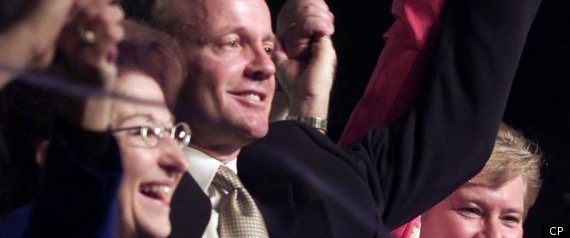 Prime Minister Stephen Harper will appoint seven new senators to the upper chamber in early January, The Huffington Post has learned.
Prime Minister Stephen Harper will appoint seven new senators to the upper chamber in early January, The Huffington Post has learned.Alberta's Betty Unger will likely get the nod to fill the one vacancy in her province.
She hasn't been contacted yet, she told HuffPost, but if the Prime Minister calls this holiday break she will gladly accept.
"Yes, if I have the opportunity," Unger said.
"I've been campaigning for Senate reform since 1998. It's an issue that I very, very strongly support. I think it's time, and I know Canadians, in countless polls, have consistently said they would like to elect all of their politicians," she added.
Unger, a Progressive-Conservative candidate, came in second to Bert Brown in Alberta's last Senate nominee election held in 2004. Former Alberta Premier Ed Stelmach extended Unger and the other shortlisted candidates' terms in 2010 and the current premier, Alison Redford, has said she plans to hold a new election process in 2012.
Brown is already a member of the upper chamber, having been appointed by Harper in 2007.
Picking a runner-up as the next Alberta Senator would be a first, Unger acknowledged, but the Conservatives have made it clear they will appoint nominees from provinces who have engaged in an electoral process.
Seven new Conservatives would bring Harper's majority in the Senate to 61 of the chamber's 105 seats.
The Tories already have a healthy majority in the red chamber due to 39 plum appointments Harper already handed to party faithful.
When the Prime Minister first began appointing his own people to fill the Senate's vacancies in 2009, his office said they were needed to push their Senate reform legislation forward.
Democratic Reform Minister Tim Uppal cited the same reason when the Tories re-appointed two failed Conservative candidates, Fabian Manning and Larry Smith, to the Senate after their unsuccessful election bids this spring.
Despite having a majority, Senate reform legislation has moved at a snail's pace.
A new version of the Government's Senate Reform Act is now in the House of Commons, after their own senators revolted and their support was less than guaranteed.
Many Conservative senators, sided with their Liberal colleagues, in thinking that the government had not thought through the long-term consequences of giving the Senate democratic legitimacy.
"The Senate wasn't set up to be elected," Tory senator Michael MacDonald said in June.
A staunch campaigner for Senate reform, Unger defended the Conservative government's decision to keep appointing senators despite having majorities in both chambers of Parliament.
Senate reform is not something you can "push," Unger said. "The Government believes that senators should be elected at the provincial level, as I was, as Senator Brown was. So what you need to have happened is for the premiers to call Senate elections in their own provinces."
"You need to have the premiers take this initiative and they are the ones who should be calling the elections, with a provincial election or municipal elections (since) stand-alone elections would probably too pricey," she said. "That's what we need to have happen."
"Vacancies keep occurring and the Prime Minister wants to fill those vacancies with elected people but if there are no elected people, he has to make the appointment," she added.
Few provinces have warmed to the idea of spending their own money to hold elections for people who sit in Ottawa.
Quebec has warned it might fight the federal government's legislation, which it views as anti-constitutional, in court. Ontario Premier Dalton McGuinty and B.C. Premier Christie Clark have both suggested they would rather see the Senate abolished. But if it can be scrapped, Clark suggested, elections were the next best thing.
New Brunswick Premier David Alward announced in November his government would hold Senate elections.
However, some of the other provinces who initially seemed warm to the idea, such as Manitoba and Saskatchewan, did not hold parallel Senate elections when their provinces headed to the polls this fall.
The Democratic Reform Minister's spokeswoman Kate Davis told HuffPost Friday, the Government is still committed to Senate reform.
"Senate reform is a long-standing commitment of our government and of our party. I won't speculate on Senate appointments, but what I can say is that the Senate status-quo, where Senators have no democratic mandate from Canadians and can serve terms of up to forty-five years, is unacceptable," Davis said.
The seven vacancies were caused by five retirements and two resignations: one in Alberta to replace retiring Liberal Senator Tommy Banks, two in Quebec after Liberal Senator Francis Fox resigned and Liberal Senator Lucie Pépin retired, one in Manitoba to replace Liberal Sharon Carstairs who resigned in October, two in Ontario after Progress Conservative Senator Lowell Murray and Conservative Senator Vim Kocchar reached the mandatory retirement age of 75 and one in Newfoundland and Labrador to replace Liberal Bill Rompkey who also retired earlier this spring.
Senators early a base salary of $132,300.
Original Article
Source: Huff
No comments:
Post a Comment